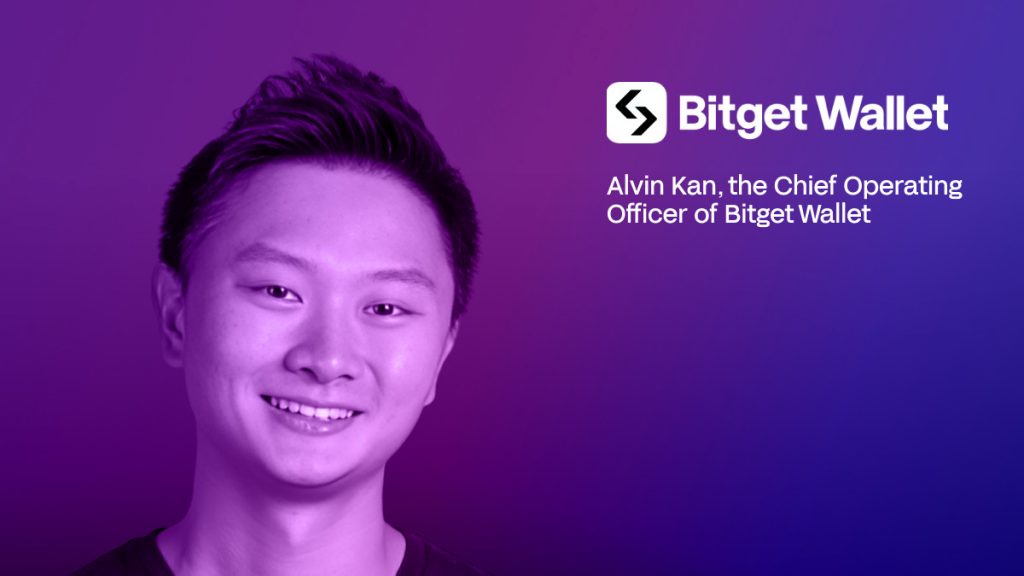From Memecoins to Institutional Adoption: Alvin Kan on Bridging Crypto Trends and Mass Adoption with Bitget Wallet


In Brief
Alvin Kan, COO of Bitget Wallet, discusses decentralized finance, cryptocurrency trading, and blockchain technology’s impact on industries, highlighting challenges and opportunities in the crypto ecosystem.

In this interview, Alvin Kan, the Chief Operating Officer of Bitget Wallet, shares his insights on the landscape of decentralized finance, the future of cryptocurrency trading, and the role of blockchain technology in reshaping various industries. With his extensive experience in both Web2 and Web3 sectors, Kan offers a unique perspective on the challenges and opportunities facing the crypto ecosystem, from the rise of DEXs to the impact of institutional adoption.
What challenges and opportunities do you foresee for DEXs as they compete with CEXs for market share?
I believe in the long run, DEXs will definitely win, but there’s a place for both. I don’t think DEXs will completely replace CEXs; users have different preferences. Looking at the charts, we see the DEX to CEX ratio in trading volume is definitely moving in favor of DEXs. The percentage of trades coming through DEXs is increasing rapidly.
The main challenges for DEXs are liquidity and user interface. Currently, much of the liquidity is still on centralized exchanges, which means less slippage. Regarding the user interface, centralized exchanges can control every part of the experience, making it faster and easier. But in decentralized exchanges, if you want to swap tokens on different chains like Solana and Ethereum, you need to be familiar with switching between them and bridging funds.
However, there are solutions to these challenges. We can make cross-chain bridging and swapping easier. For example, in Bitget Wallet, you can already do a cross-chain swap very easily. We need to develop technological solutions and educate users on how to use them.
As for opportunities, when people talk about the latest 100X opportunities, you often find them in the Web3 world, in DEXs rather than centralized exchanges. Over 90% of tokens can be found on DEXs but not on centralized exchanges. In the decentralized world, there’s going to be a lot of innovation. We need developers who can leverage smart contracts and decentralized governance to offer unique trading features that you can’t offer in a centralized exchange. The flexibility provided by smart contracts allows for innovations like earning yield upon yield, as long as the tokenomics make sense.
Do you think there are any emerging trends in cryptocurrency trading?
On the macro side, we’ve seen Bitcoin dropping a little recently. It’s very volatile, and I foresee volatility continuing for a while. Many people are looking at the $60,000 level as a support, which it has already breached, going down to $58-59k. I’m not too concerned about this, to be honest. The big worry is whether the Fed signaled interest rate cuts too slowly, potentially leading to economic downturns. Many people are also looking at the upcoming US presidential elections as a factor that could move the market significantly.
Despite the volatility, there are strong indications that institutional adoption of Bitcoin and Ethereum is increasing. Every fund I’ve spoken to, including family offices and Web2 funds, is talking about allocating a small portion of their portfolio to crypto. That’s a lot of money on the sidelines waiting to come in.
Recently, there was news that tokenized treasury bills have reached a $2 billion market cap, doubling from $1 billion just a few months ago. This rapid increase shows that institutional money, which represents most of the world’s wealth, is starting to enter the crypto space.
I’m also excited about the innovation happening in Web3, particularly with Telegram’s 950 million users potentially entering the space. The challenge for builders now is how to convert these users from using Telegram mini apps to actually participating in DeFi. This is particularly exciting because DeFi was primarily intended to serve underbanked or unbanked people, and many of Telegram’s biggest adoption countries are developing nations.
What industry within Web3 do you think governments should focus on?
I think they have to see it in a broader context, but stablecoins are definitely the immediate focus. Stablecoins will become integral to many financial organizations because blockchain transactions are automated and more efficient than current systems. Look at how much volume platforms like Uniswap are facilitating, all on smart contracts.
However, blockchain and Web3 are more than just stablecoins. They’re like AI in that they apply to every industry. It’s about the decentralization of things – money, governance, and more. This applies to the economics of many industries. We’re seeing decentralized music platforms ensuring more revenue goes back to the artists rather than intermediaries. In DeFi, we have self-custody, eliminating the need for intermediaries to hold your money.
From a capital market perspective, projects like Helium have shown how tokens can be used to incentivize network building, disrupting traditional fundraising models. So governments need to see blockchain not just as stablecoins but as a technology that’s going to disrupt every industry.
What drives the interest in memecoins? What can support their long-term viability in the cryptocurrency ecosystem?
Memecoins have dominated the news since the start of this bull run in November. People are looking at what’s happening in the cultural context and quickly replicating them into memecoins. The underlying reason is that technology has facilitated the creation of such movements. In the past, Web2 platforms like Facebook or Telegram allowed people to gather common ideas, but they couldn’t create monetary value from that. With memecoins, you can quickly create a coin around a certain theme, and suddenly people are trading and talking about it, giving a market cap value to this movement or cause.
Will it sustain? I think the trend of memecoins will sustain, but whether each memecoin will sustain depends on if you can turn a meme into a brand over time. We’ve seen this with NFTs, where some projects created NFT platforms and retail brands. For example, if Bonk can create useful products or a useful brand, it might be sustained for a long time.
Given the volatility of memecoins, do you foresee any challenges for this industry?
Definitely, when people think about memecoins, they often view crypto as a gambling den or casino. But we see stocks behaving like memecoins sometimes too. We live in a very volatile world today. Speculation will always happen, and memecoins will always be created around real-world events. The challenge is the stigma of memecoins being just speculation, which will unfortunately continue.
However, we should also look at the benefits of memecoins, such as how they’re facilitating millions of people coming to the virtual world and starting to learn about it. I think that’s actually more important in my opinion.
How might the implementation of privacy-enhancing technologies in cryptocurrencies impact their mass adoption?
It’s funny sometimes when people talk about privacy in Web3 as something very new, often comparing it to security and suggesting that privacy might compromise security. I don’t think security and privacy are at odds; you can have both. In Web2, privacy has always been a concept to consider.
I think privacy options will drive better adoption because users today are already attuned to wanting privacy options due to Web2 experiences with things like GDPR (General Data Protection Regulation). Having privacy options in Web3 will only accelerate adoption, and it’s necessary because people have been trained in Web2 to want privacy.
The challenge is how to maintain anonymity in a way that’s compliant and suits how blockchains work, given wallet addresses, and so on. These innovations are already underway.
What have wallets done to enhance user protection?
Most wallets should have standard features like token screening and anti-phishing links. Looking at Bitget Wallet specifically, one key aspect is its decentralization, which is standard across all self-custody wallets. Self-custody is really important, especially in light of recent hacks where hundreds of millions of dollars were lost in centralized systems.
Bitget Wallet is separate from Bitget exchange, so it’s entirely independent and self-custodial – your keys, your coins. We also have MPC (Multi-Party Computation) wallets, which make it easier for people to onboard Web3 in a very secure way. There’s also biometric verification, especially in our mobile app, which enhances security through features like Face ID.
Lastly, we have a $300 million protection fund, which I think is unique to the Bitget ecosystem and provides an additional layer of financial security for users.
How do you foresee the crypto market in the near future, say in one year?
I am naturally bullish; otherwise, I guess I wouldn’t be in this industry. Volatility will continue for sure. With US elections at the end of the year and expectations of interest rate cuts, coupled with not-so-good economic indicators, I think you’ll hear news almost every other week that will make the crypto market go up and down.
However, I am bullish in the long run. Institutional adoption is coming in, and that’s for sure. All the indicators point to this. I have many friends whose bank relationship managers are starting to call them, asking if they want to buy Bitcoin or some crypto-related ETFs.
On the retail side, we see Telegram bringing hundreds of millions of users into the space. Retail interest is also coming in, probably not in the same way as the last cycle, but with trends like memecoins on Solana and now with Telegram, I think there will be more events that bring mass onboarding of Web2 people into Web3.
Given these factors, plus all the innovation we’re seeing happening in crypto, I can’t help but be bullish on the whole ecosystem.
Disclaimer
In line with the Trust Project guidelines, please note that the information provided on this page is not intended to be and should not be interpreted as legal, tax, investment, financial, or any other form of advice. It is important to only invest what you can afford to lose and to seek independent financial advice if you have any doubts. For further information, we suggest referring to the terms and conditions as well as the help and support pages provided by the issuer or advertiser. MetaversePost is committed to accurate, unbiased reporting, but market conditions are subject to change without notice.
About The Author
Victoria is a writer on a variety of technology topics including Web3.0, AI and cryptocurrencies. Her extensive experience allows her to write insightful articles for the wider audience.
More articles

Victoria is a writer on a variety of technology topics including Web3.0, AI and cryptocurrencies. Her extensive experience allows her to write insightful articles for the wider audience.

















































